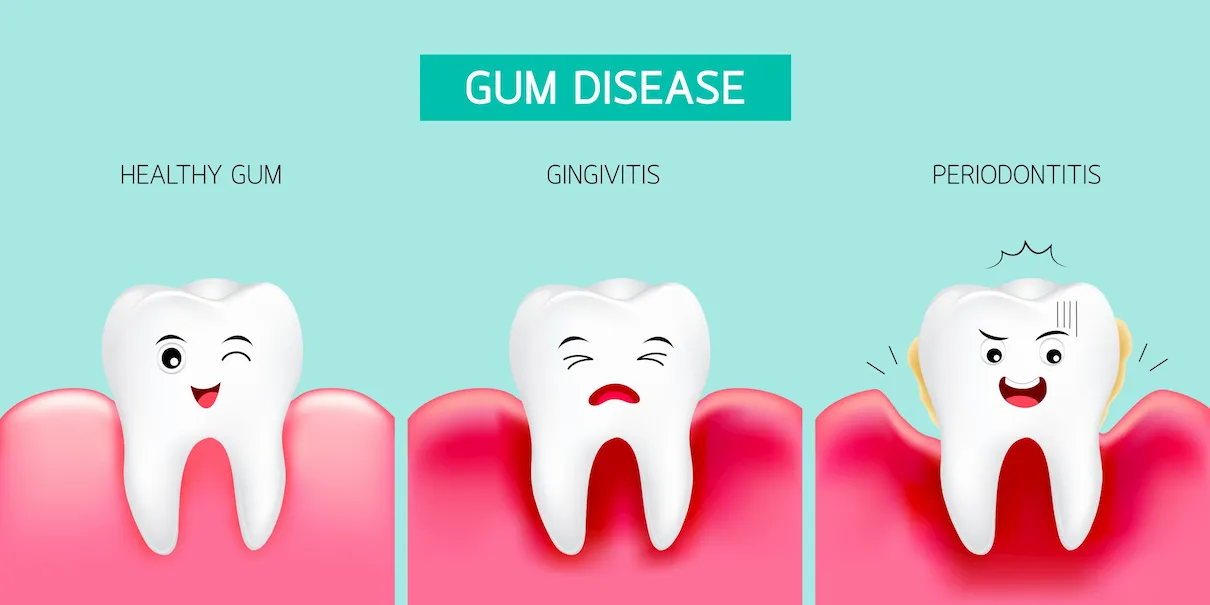Submit Request ...
-
Forums
Gingivitis and How to Cure it

If your gums are swollen, inflamed, or tender when you brush, you may have gingivitis. This news may make you feel like you've failed in the oral hygiene department, but don't worry, it's actually pretty common. Left untreated, it can develop into a more severe condition, so it's important you take the necessary steps to reverse your gum disease right away. Luckily, we've got some tips and advice that will get your gums back to good health so you can continue smiling.
✓ Gingivitis is a mild form of gum disease caused by plaque that's built up around your gumline
✓ When bacteria builds up around your gumline it creates a layer of plaque, a soft, sticky, colorless film. Plaque that goes untreated can harden and turn into tartar. Plaque and tartar both cause gum disease. In its earliest stages, gum disease is called gingivitis.
✓ According to the Journal of Dental Research, nearly half of adults over 30 in the US ( 47.1 percent) have some form of gum disease. Left untreated, gingivitis can develop into periodontitis. This more severe form of gum disease can cause your teeth to loosen or even fall out. That's why it's so important to address signs of gingivitis right away.
What Are the Symptoms of Gingivitis?
The best way to catch gum disease early is to visit your dental professional for regular checkups because it's possible to have gingivitis and not show any symptoms at all. Once the effects become perceptible, you may experience:
- Swollen gums
- Soft puffy gums
- Receding gums
- Occasionally tender gums
- Gums that bleed when flossing or brushing
- A change in gum color from pink to red
- Persistent bad taste in your mouth
- Loose teeth
- persistent bad breath.
If you notice any irregularities or sensitivities in the health of your gums, don't wait until your next checkup – make an appointment with a dental professional right away.
Causes and Risk Factors of Gingivitis
✓ The leading cause of gingivitis is poor oral hygiene. By taking care of your mouth, you're best positioned to have healthy, disease-free gums. But there are other risk factors, too.
- Certain lifestyle choices can increase the risk of getting gingivitis, like:
- Smoking
- Poor oral hygiene
- Unhealthy diet
- Obesity
- And stress
- Age (According to a study published in the Journal of Dental Research, 64% of adults over 65 have either moderate or severe periodontal disease.)
- Medications (Some medications can have adverse effects on your oral health. Speak with a medical professional about any potential side effects your medicine could have.)
- Diseases
Other medical conditions can increase your risk of gum disease, like:
- Diabetes
- Osteoporosis
- Cardiovascular disease
- And pregnancy complications can all contribute to periodontal disease.
Other illnesses are being evaluated for possible connections to gum disease, including pancreatic cancer, pulmonary disease, and rheumatoid arthritis.
Practicing good oral hygiene is the best way to prevent gingivitis. Some care tips:
- Brush 2x a day
If regular brushing is already part of your routine, double-check that you are using the correct tehcnique. Your healing gums might require a gentler touch first, so make sure you are using a soft-bristled brush and applying the right amount of pressure. - Clean between your teeth once a day
Use a water flosser or interdental brush to get between your teeth and under your gumline to remove irritants like bacteria and food debris and help reduce inflammation. - Add a mouthrinse for extra protection
An over-the-counter antimicrobial mouthrinse will help you treat infection and control bacterial growth in your mouth, too. Ask your dental professional for their recommendation.
And be sure to see your dental professional for regular appointments – not only to keep your teeth pearly white but to check on the health of your gums, too.
How To Diagnose and Cure Gingivitis
✓ If you're not showing any symptoms of gingivitis and you have gum disease, your dental professional will be able to diagnose you at your next appointment. If you are experiencing symptoms, call your dental professional to see if they recommend coming in for a visit right away. Your dental professional will be able to give you a thorough cleaning to remove any plaque from the surfaces of your teeth and under your gumline. If the plaque calcifies, your teeth might require a more advanced technique called scaling and root planing.
✓ Your dental professional will do more than clean your teeth. They will examine your mouth for any other abnormalities and make recommendations that might make it easier for you to clean your gums and teeth at home. For more severe cases, your dental professional might use a dental probe to measure any pockets that develop at your gumline to see if your condition is progressing toward periodontitis.
Are There Home Remedies for Gingivitis?
If you're searching for a gingivitis home remedy, you may have read that turmeric and sage have beneficial properties for your gums. While there have been studies that show benefits to your gum health, the best way to ensure you reverse your gum disease so it doesn't develop into a more severe condition is to visit your dental professional.
If you notice any tenderness, swelling, or bleeding in your gums, call your dental professional for an appointment. By detecting gingivitis symptoms early and seeking treatment, you can quickly and easily relieve your symptoms and restore your gum health to a condition you can smile about.
Please let us know what you think!